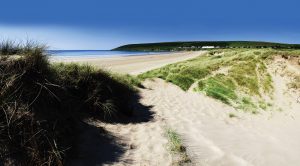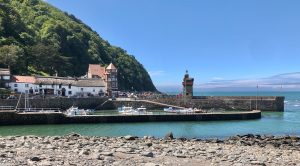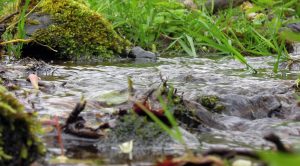Protecting Heritage includes, but is not limited to preserving, excavating, displaying, or restoring a collection of these things. Heritage is entwinned in our contemporary activities, meanings, and behaviours.
Devon has parts of two World Heritage Sites, which have been determined as being of outstanding universal value and of global importance by UNESCO. The Dorset and East Devon Coast natural site, popularly known as the Jurassic Coast, was identified for its geology, geomorphology and fossil interest. The Cornwall and West Devon Mining Landscape cultural site, known as Cornish Mining includes the Tavistock and Tamar Valley areas in Devon and relates to the cultural landscapes created by the tin mining industry and associated activity in the nineteenth century. See Environment for details of the third World Heritage Site – North Devon Biosphere Reserve.
National Trust
The National Trust has a key role in promoting the preservation of, and public access to, buildings of historic or architectural interest and land of natural beauty. See Devon – South West – National Trust for more information on the many Devon sites managed by the National Trust.
Historic buildings and sites of interest play a key part in our heritage and the following are an indication of the wealth of such sites in Devon.
Castles:
- Berry Pomeroy, Totnes.
- Dartmouth Castle, Dartmouth.
- Lydford Castle, Okehampton.
- Okehampton Castle.
- Tiverton Castle, Tiverton, Mid-Devon.
- Totnes Castle, Totnes, South Hams.
- Castle Drogo, Drewsteignton.
Abbeys
- Buckfast Abbey, Buckfastleigh.
- Torre Abbey, Torquay.
City Walls &Tunnels
- Rougemont Castle, Exeter and the Exeter City Walls.
- Exeter City Tunnels.
Natural Capital
It should be no surprise that Devon has a wealth of Natural Capital, with a rich environment and varied habitats for which initiatives are in place to restore and protect it.
Tourism
The South West region is the UK’s third largest visitor economy, with Devon playing a key role in attracting visitors, with a spend of over £2.5Billion per year.
Environment
Devon’s diverse natural habitats include woodlands, wetlands, moorlands, meadows, hedgerows, rivers, estuaries, and many more beneath its coastal waters.
Devon’s Climate Emergency
The Devon Climate Emergency project is raising awareness and encouraging everyone to act to reduce their carbon footprint and prepare for the future climate.



